
News
Summers Will Not Finish Semester of Teaching as Harvard Investigates Epstein Ties

News
Harvard College Students Report Favoring Divestment from Israel in HUA Survey

News
‘He Should Resign’: Harvard Undergrads Take Hard Line Against Summers Over Epstein Scandal

News
Harvard To Launch New Investigation Into Epstein’s Ties to Summers, Other University Affiliates

News
Harvard Students To Vote on Divestment From Israel in Inaugural HUA Election Survey
Author on Le Corbusier Chronicle

When Nicholas Fox Weber came to Harvard on Nov. 20 to promote his new biography on famed Modernist architect Le Corbusier, he spoke in the only Le Corbusier building on the entire North American continent—Harvard’s own Carpenter Center. His “Le Corbusier: A Life” is the first-ever in-depth biography of the Swiss architect. As the Executive Director of the Josef and Anni Albers Foundation in Bethany, Conn. and author of an acclaimed biography on Balthus, he is deeply interested in exploring the lives of the artists who create the masterpieces he loves.
The Harvard Crimson: First of all, why Le Corbusier? What about his life or his art compelled you to write about him?
Nicholas Fox Weber: Well, originally, it wasn’t my idea. I had just written a biography of Balthus, and my editor in England said, ‘You know, there’s never been a biography of Le Corbusier.’ I had been to [Le Corbusier’s] Villa La Roche in France in the 1970s and loved it like few other buildings in my life, but I knew nothing about the man. And when I began to get to know Le Corbusier—in writing his biography—I found that I knew even less about him a few months after I started than when I began. It was like facing the wall of a Swiss bank vault. Fortunately, I then had access to his letters, and a human being began to come alive for me. Going back to your question, I’m really only interested in writing about people whose works I consider to be marked by genius. For me, Le Corbusier’s architecture was fascinating, and that’s what sparked my curiosity about Le Corbusier the human being.
THC: Why is yours the first in-depth biography ever written about such a legendary architect and artist?
NFW: I think people were afraid of him during his lifetime...He was so prickly, so opinionated, that no one wanted to work with him. Why no one tackled it since then I don’t know. I don’t know why the subject has proved so daunting. He was definitely what we would call a control freak in every aspect of his life. There is so much about this man—love affairs, politics, [and] you have his willingness to work with Lenin, Mussolini, Petain, de Gaulle, Nehru, and the American government in the 1930s. There are so many facets to Le Corbusier and at the same time a private life that is very hard for people to understand. I just think biographers didn’t know where to begin.
THC: On the note of art and politics, Le Corbusier was famous for wanting to improve living conditions in crowded urban environments through his architecture, for wanting to better society through art. To what extent do you feel that art should be political?
NFW: Well, I think it’s absolutely wonderful to try to improve other human lives, on any scale, whether a doctor does it by providing medical services or a government does it by helping people put food on their tables. [Le Corbusier] didn’t really have political motives in the sense that he didn’t particularly want to engage in a government; he simply wanted to use any government he could to let him build and let him improve housing. The world is full of architects who are desperate to have more money or more status or to be more important, but I don’t feel that that’s what motivated Le Corbusier. I think that what motivated him was a desire to make the world more visually appealing.
THC: When you came to Harvard to promote your book last week, you spoke in the Carpenter Center, Le Corbusier’s only building in North America. How well do you think the building reflects the unique personality of its architect?
NFW: Well, the Carpenter Center was not a terribly important project for Le Corbusier. He did not see the site in advance, he designed the building before he’d ever been to Cambridge, and when he came to Cambridge, he was disappointed with the site. The building shows his usual sense of rhythm — there are some wonderful ramps, some wonderful colors, and some wonderful changes of space. Unfortunately, his one American project was not the achievement of a man at the peak of his powers.
THC: What I find most interesting about your book is how mercurial Le Corbusier’s personality was. What do you think we gain from an understanding of the artist’s life?
NFW: The thing I hope I point out in my book is what a passionate enjoyer of visual beauty Le Corbusier was. He was the type of man who bemoaned the idea that people no longer walked up stairs two at a time. That was how he was, with such a zeal for life. That intensity is felt in his architecture, and his intoxication with beauty is his most important quality.
Want to keep up with breaking news? Subscribe to our email newsletter.
